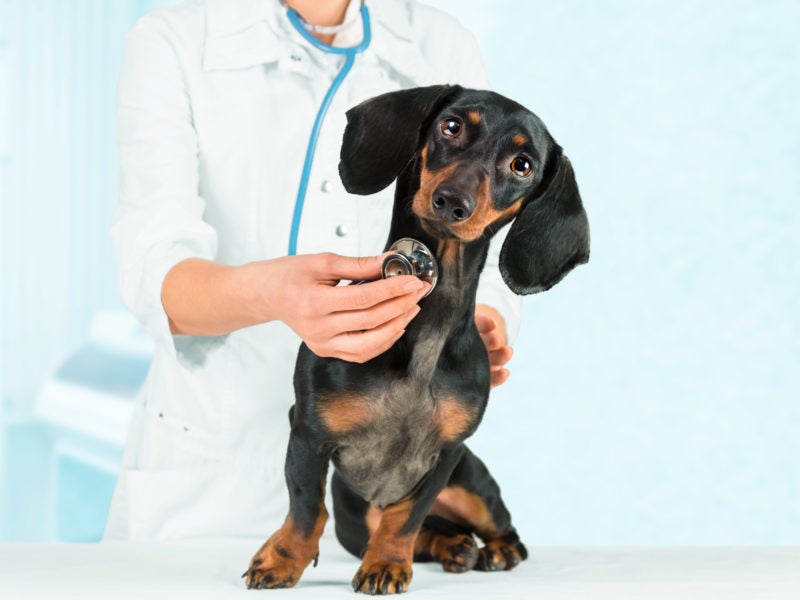
When you add a dog to your family, one of the most important relationships you should develop is with a veterinarian/veterinary hospital. The first exam, recommended tests and vaccinations provides an important foundation for the future when your pet has subsequent wellness exams, or if your pet becomes ill.
Taking your dog to the veterinarian is not always a fun experience for your dog. For some dogs, the strange smells and sounds can cause a lot of anxiety for a dog not unlike people having to go to the dentist.
So how can we make the most out of every vet visit and make the experience at least “near-perfect”?
FINDING THE RIGHT VETERINARIAN
First, find the right veterinarian for you, your expectations and your budget. Ask friends and neighbors for advice. Some hospitals may have passed AAHA qualifications (American Animal Hospital Association) and have fee-free certified staff or meet other certifications. Find a veterinarian and staff that you feel comfortable with and who meets your needs and those of your dog. Choose a veterinarian that seems interested in listening and answering your questions. Also realize that although a good veterinarian knows a lot about many things, they may not always know every answer on the spot. A good veterinarian should be willing to research or if needed will refer you to a specialist for further care.
CONVENIENCE
Having a veterinarian that is close by is ideal not only for regular issues, but especially if your pet becomes ill or has an emergency. Ask about after hours emergency care before an emergency happens. Many veterinarians may refer you to an emergency clinic for afterhours care or may charge an additional fee for emergency appointments.
BUDGET
Before deciding to add a new dog to your family, familiarize yourself with health care costs and have a plan for how to most effectively meet those costs. Just like with people, all dogs need health care including wellness care, illness care, dental care and emergency care. Medical care in animals can become costly, and it’s important that you budget appropriately for these expenses.
Invest in health insurance or a separate savings account for your pet to minimalize the mental anguish of having to make decisions based on costs. Every pet needs medical treatment and it’s important to be realistic about those costs and have a way to pay for them when they occur. You should also be aware that regular health screenings, vaccinations and dental care are usually less expensive than waiting until health problems become serious.
COMMUNICATION
Effective communication with your veterinary team is a two-way street. Prior to your appointment, take the time to write down your concerns and questions for your veterinarian. Make notes on the responses so you leave with accurate information. If you are unclear on something your veterinarian says, ask for a further explanation. It’s not unreasonable to ask about reasons for and costs of medications and tests. They may also be able to give you other possible options if the cost is a concern.
TIME
Veterinary hospitals are busier than ever before. This is due to more people getting new pets, but also a shortage of veterinarians. Allow plenty of time to get to your veterinarian’s hospital prior to your appointment. Many veterinarians are no longer able to accommodate late appointments or may have to limit the time they spend with your dog if you arrive late. In fact, it’s best to arrive a few minutes early so that you can complete any necessary paperwork. If your veterinarian offers patient forms online, fill them out at home and bring them with so you are ready for your visit. The less rushed you are, the less stress your dog will feel.
TOPICS TO ADDRESS
Be prepared to ask your veterinarian about a variety of topics related to your pet’s health and well-being. This is especially important for your dog’s first visit to the veterinarian. Topics should include:
- Behavior
- Dental Care
- Diet
- Exercise
- Health problems
- Parasite protection
- Training
- Vaccinations
- Wellness care
Even if your pet was checked out by a veterinarian when they were at the shelter, or before you obtained your dog from a responsible breeder, you should still make an appointment for your pet within the first week or two. Your dog may be due for additional medications to keep them (and you) safe in their new home.
Bring your adoption papers from the shelter or paperwork from your responsible breeder. This will help your veterinarian get to know your pet’s medical history, and which vaccines they’ve already had, or still need.
With a new puppy or dog or if changing veterinarians, always bring a list of any medications or supplements your pet is on, how often they take them, as well as the food you’re feeding them. If it’s easier, bring photos or just bring the medications with you to the office. You can then explain what each one is and why your pet needs it.
Your veterinarian should be your partner in the health and care of your pet. Approaching your interactions with that perspective will help maximize the effectiveness of care for your dog and help it live a longer, healthier and happier life.

